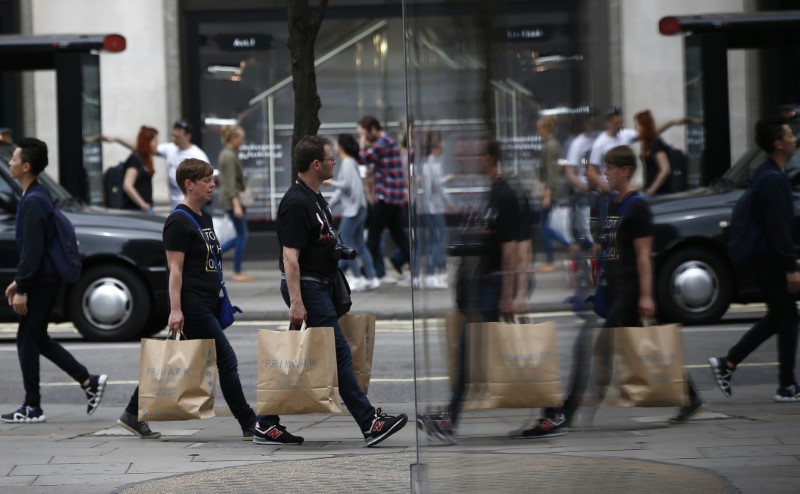By David Milliken and Paul Sandle
LONDON (Reuters) - British retail sales recorded their first year-on-year decline since 2013 last month as consumers struggled with fast-rising prices and stagnant wages.
Although the fall was less severe than analysts had expected, the official data showed a 0.3 percent year-on-year fall in sales volumes -- the biggest since March 2013.
That partly reflected a very strong performance by retailers in October 2016 which distorted the comparison.
"We are continuing to see an underlying picture of steady growth in retail sales, although this October suffered in comparison with a very strong October in 2016," ONS statistician Kate Davies said.
Mild weather also put shoppers off buying winter clothes, adding to the weakness in the figures.
But volumes were still far lower that they were before the June 2016 vote to leave the European Union hit sterling and drove up inflation.
Looking at the three months to October, which smoothes out monthly volatility in the data, sales growth picked up to 0.9 percent from 0.7 percent in the three months to September.
This meant sales volumes in the three months to October were just 1.1 percent higher than the year before, the weakest growth rate since May 2013.
Sterling rose slightly after the data and British government bond prices edged down as the sales figures came in less weak than suggested by a series of other surveys of retailers.
"This is in stark contrast to the survey data which were pointing to an absolute bloodbath," Alan Clarke, an economist with Scotiabank, said.
"Things are probably as bad as they are going to get, so I'd be hesitant to extrapolate the downward trend too far," he said. " Next year should be a better year as lower inflation and firmer wages reverse this year's downwards trend."
Economists taking part in a Reuters poll had predicted sales would drop 0.6 percent on the year and grow just 0.1 percent on the month, according to the median forecasts.
The ONS said monthly sales in fact rose by 0.3 percent along with the minus 0.3 percent year-on-year figure.
SLOW DOWN
The Bank of England raised interest rates on Nov. 2, saying it forecast household consumption growth, adjusted for inflation, would slow to 1 percent next year from 1.5 percent.
It also said it expected inflation would peak in October before slowly falling back towards its 2 percent target over the next three years.
Official data earlier this week showed that consumer price inflation held at a five-year high of 3 percent in October while regular pay, adjusted for inflation, suffered its longest run of falls in almost three years.
Recent reports from British retailers have also indicated consumers may be tightening their belts. Department store chain John Lewis (JLP.UL) has posted seven straight weeks of sales decline, clothing retailer Next (L:NXT) missed analysts' quarterly forecasts, and Marks & Spencer (L:MKS) said it faced "stronger headwinds" in food and was slowing openings of its upmarket convenience stores.
The ONS said that retail sales growth in cash terms slowed to an annual 2.8 percent in October, down from 4.6 percent in September and the weakest since June 2016.

The gauge of inflation used in the retail sales data, the retail price deflator, dropped to 3.1 percent in October from 3.3 percent in September.